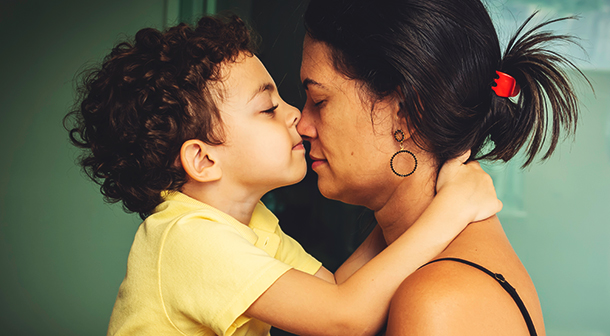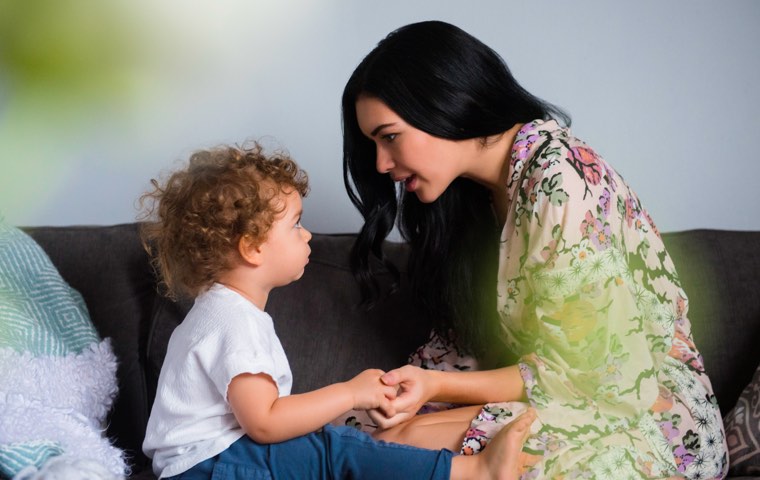Understand the Why Behind the Whining
By Elizabeth McBride
Read Time: 7 Minutes
Why Whining Is So Annoying
It's okay to admit that the sound of your child's whiny voice pushes your buttons. The fingernails-on-a-blackboard sound of a whining toddler can test even the most patient parent. Children use whining to get an adult's attention or to get help with a need or problem they have.
A 10-month-old baby's whine may sound more like crying, but once toddlers learn to speak, whining becomes a mixture of talking and crying. The good news is that whining tends to peak when kids are toddlers and decrease as they get older.
At some point, every parent experiences the pain of trying to negotiate with a whining toddler in a store or other public place. It can leave you feeling powerless and at the mercy of your child's demands. Not a fun place to be!
However, having a child who whines is nothing to feel bad about. When your baby or toddler whines, he (or she) is communicating valuable information to you. If you can understand why your child is whining, you can help him feel understood and heard, which is not only great for your relationship but means he will be less likely to whine in the future. Learning what triggers your child to whine can help you meet his needs and help him grow into a big kid who can communicate his needs in more positive ways. Eventually, he will stop whining altogether. Yes, a whining-free future is possible!
Need parenting help now?
The Texas Parent Helpline is available 24/7.
- Call 833-680-0611
- Chat with us
- Text 833-680-0611

Why Kids Whine
Whining is an urgent request for comfort, help, or a connection with you. Understanding why your child is whining can help you respond with compassion and enable you to work with him to problem-solve and prevent more whining in the future. Before you react to your child's whining, take a deep breath and try to identify what's causing it. You know your child best. What is he trying to communicate? Think of yourself as a translator and the whining is a foreign language you're trying to understand. Once you've considered what's causing the whining it'll be easier for you to respond more calmly instead of going straight to being annoyed.
Here are some common reasons that kids whine:
They are tired, hungry, or stressed.
- Think through the child's day. Did he sleep well the night before? Did he do more activities than usual? Is he getting sick? Does he need to eat a snack?
- Calmly show him how you would want him to speak to you by repeating his request in a calm and polite voice. Say something like, "May I please have some milk?" Your child might not understand that there's a problem with the whiny voice or even know that he is using it. Teach him the way you'd like for him to ask for things.
- Once you've met his immediate request, look at how you might address what's behind the whining. Your child is using whining to communicate a need. If you can address the real need and not just react to the whining, your child should find other ways to communicate instead of whining.
They need to feel more connection to you.
No one can (or should) be a playmate to their child 24/7. But whining may be a sign that he needs some attention from you.
- Repeat your child's request back to him using the words you would like to hear instead of whining. For example, say, "Would you like for me to stop what I'm doing and play with you? Can you think of a different way to ask me?"
- If possible, take a moment to connect with your child by playing with him, reading a book, or snuggling and talking. If you can't stop what you're doing, explain to your child that you need a few minutes to finish and then you'll take a break to spend time with him. You can explain to him that taking this time to be together is important to you, and that you'll make time for it by saying, "Let's read one book, and then we both need to get back to work."You can explain what work you're doing and that your child's work is drawing a picture, doing a puzzle, playing with playdough, or some other developmentally appropriate activity he can do by himself.
- The message you are communicating to your child is, "I love you and want to spend time with you. You can trust that I will make time for us to connect."
If you are having issues with a child whining when you get home from work, try to spend 5 or 10 minutes with him as soon as you get home instead of starting to make dinner or doing other tasks right away.

They are feeling sad or disappointed.
For children, whining is another expression of emotion, much like crying.
- It is perfectly understandable if your initial response is to want to shout, "Stop whining!"But instead of feeling frustrated with your child's whining, think about whether there's some emotion he needs to express.
- Try to correct the whining by saying something like, "It sounds like you are really upset. Can you ask me for help using your normal voice?"
- By doing this, you are giving him a chance to express his feelings and showing him that you care and want to help him work through what's upsetting him. You are also showing him the kind of voice you want him to use in the future.
They are more sensitive than other kids.
All children are different, and that's fine. Your child's natural level of sensitivity may be wonderful to see when he is content - and hard to handle when he's not.
- Pay attention to what triggers seem to set off your child. Is it certain foods? Not getting enough sleep? Being in a new place? Too many activities and not enough downtime? Once you start to see a pattern, the whining will feel less frustrating and more understandable.
- You can help your child see the connection to his triggers and emotions too. When he whines, you could say, "Oh, you missed your nap today. I know being tired makes everything feel harder."
- Work with him to problem solve. Ask, "What could we do to make it better?"
Sometimes whining pays off.
Every parent has experienced being in a store with a child who is whining because he wants a treat. Sometimes the whining can turn into a full-blown temper tantrum. It's embarrassing, and to avoid further humiliation parents may give in to a child's request. Research shows that giving in to the whining teaches children that it's a great way to get what they want.
- Be consistent. Rewarding whining with a treat will only teach your child that he can use it to wear you down and get what he wants.
- Stay firm and calm. Do not react.
- Surprise your child with the occasional treat. Make it a practice to surprise your child with treats that are "just because" and not a result of whining. This shows your child that he does not need to demand treats by whining. He can trust that you will provide these things from time to time.

How to Stop Whining Before It Starts
- Give your child your attention. Kids whine for attention - even if it's negative attention. Stop whining before it starts by giving your child positive attention. Even short, 10-minute bursts of undivided attention from you can make a big impact on reducing your child's whining. If your child isn't getting enough of your attention, you may find he whines more.
- Make sure your child is getting enough sleep and that mealtimes and snacks are consistent.
- Keep your child's frustration to a minimum by making sure he can handle what you expect of him.
- Praise your child for using his normal voice instead of his whiny voice.
Notice when your child asks for something using his normal, non-whiny voice and praise him for it. Reinforcing this positive behavior increases the likelihood that he'll use his normal voice again in the future.
Tips for Breaking an Older Child of the Whining Habit
In addition to whining to get their needs met, an older child may whine because he has learned it's an effective way to get what he wants.
- Kids whine because it works. So, make it not work. Stop giving in to the whining. Do not reward the behavior.
- Establish a household rule about whining and make sure all caregivers are on the same page.
- Ignore whining. Set the expectation ahead of time as to how you'll respond to whining, such as, "I don't understand whining. When I hear the whiny voice I will ask you to ask again in a nice voice."
- Remind your child there is a rule against whining. Say, "We don't whine to get what we want." This helps your child define what whining is and gives him a chance to try asking another way.
- Give positive attention when the whining stops.
- Prevent whining by helping your child understand his feelings and how to address what he needs without whining.

The next time your child whines, try this simple tip.
Let's face it. You can teach using a "grown-up voice" all day long, but your child will still have hard days and whine sometimes. The next time your child whines, before you respond with frustration, try doing something that will help both you and him calm down.
Ask your child if he needs a hug.
You could say something like, "Are you low on hugs? I know I am."
If your child is open to getting a hug from you, reach out and hold him as long as he needs to feel calm and reassured. This reset helps both you and your child breathe and calm down. It also develops trust that he can count on you to help him through moments of frustration. Building a trusting, secure relationship with him will ensure that he can always come to you for empathy and calm support, whether he's 3 or 13.
Responding with a hug helps reframe whining as more than just an annoyance. It can actually be an opportunity to connect with your child and form a loving foundation of trust that you will build on through every age and stage of parenting.




